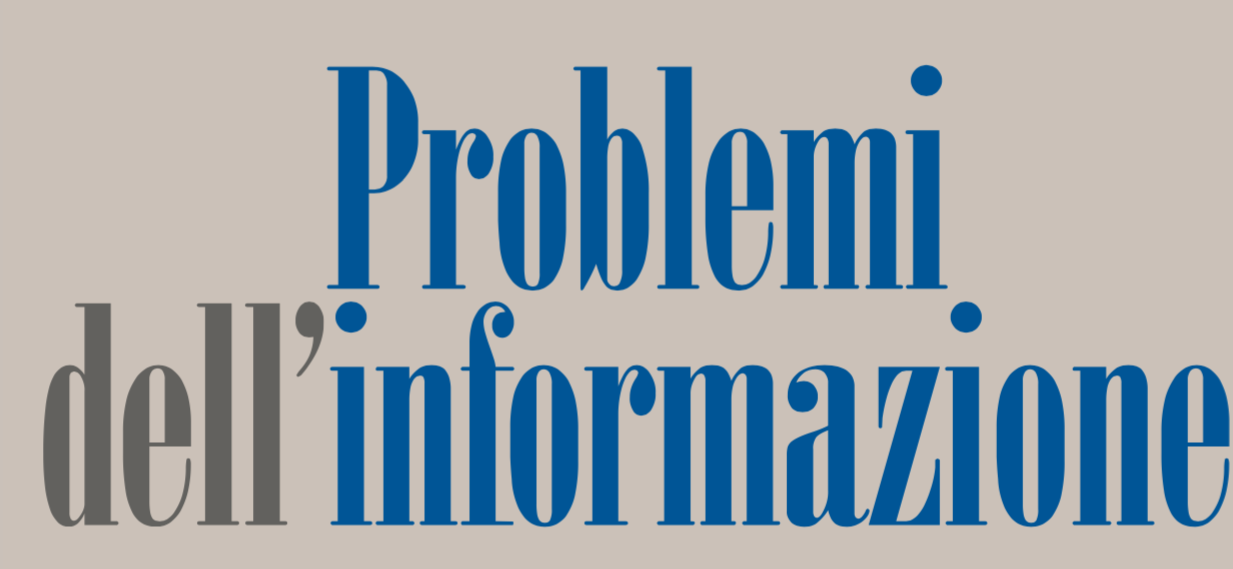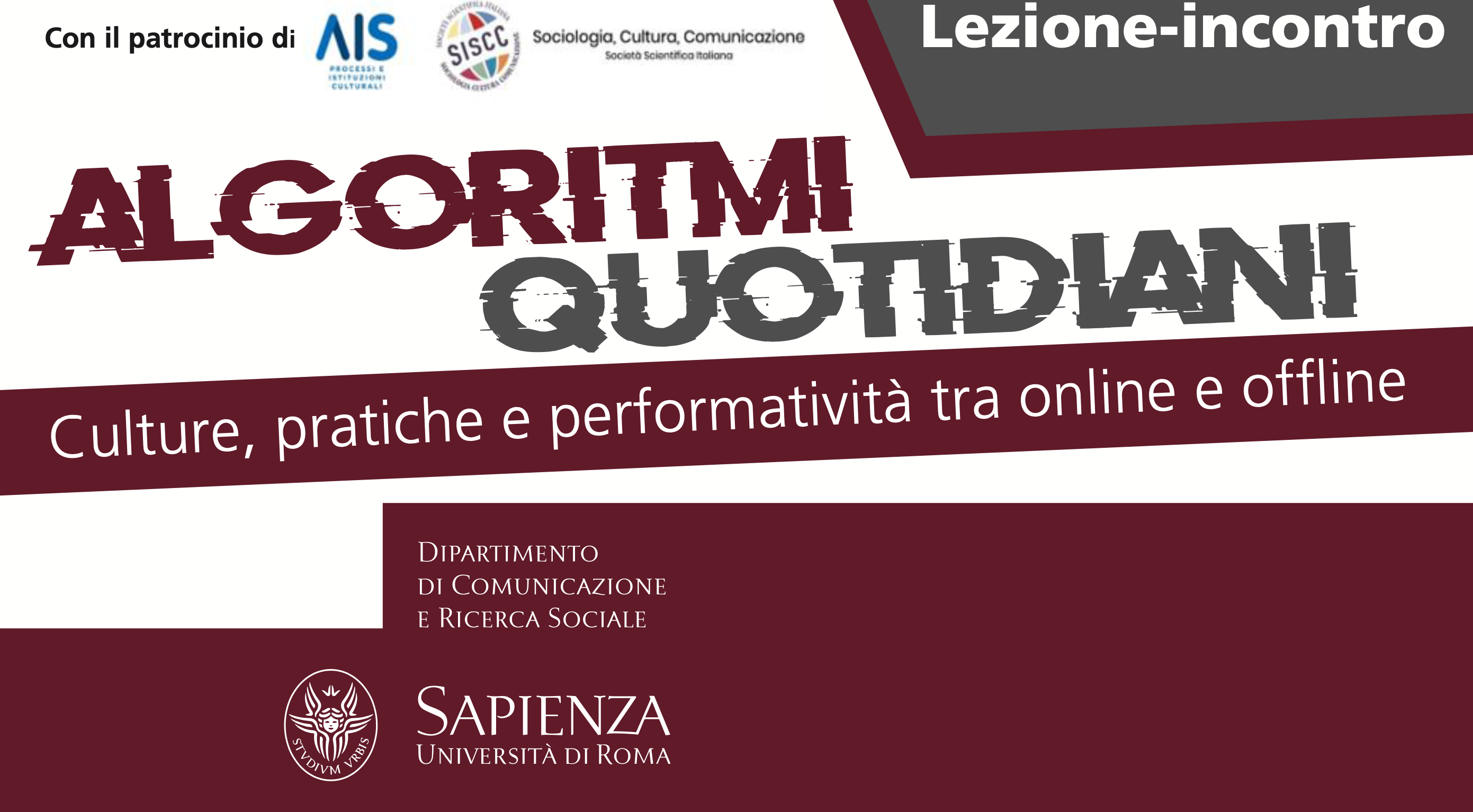Problemi dell’Informazione
n. 1 2023
Special issue call for paper
Guest editors: Chris W. Anderson and Augusto Valeriani
In the early days of the commercial internet, a number of scholars (Anderson 2011, Deuze and Witschge 2018, Reese 2016, Wahl-Jorgensen 2016) proposed the idea of an ecosystemic approach as a new way to study both journalism institutions as well as the tangled web of messages these institutions produce. According to these and other theorists, the advent of digital technology rendered problematic previous frameworks that took news institutions as isolated analytical and empirical categories. Digital technology also complicated news diffusion models that saw media messages as largely moving between institutional producers and audience members, arguing instead that news and information traveled across a variety of institutional, technological, and human pathways, the content of those messages morphing and transforming along the way.
In the past decade, as both the architecture of the internet and the political environment in which journalism is practiced has changed dramatically, the ecosystem metaphor has been both critiqued (Nadler 2019) and adopted by a number of researchers conducting largely “practical” academic research (Holcomb 2021, Kostovska et al. Stonbely et. al. 2019). By and large however (with a few exceptions) most recent research in political communication and mainstream journalism studies either replicates the original notion of the media ecosystem metaphor or does not engage with the ecosystem literature at all, despite seemingly fruitful methodological and empirical overlaps. In particular, perhaps because of its overwhelming focus on media message effects, the disinformation and propaganda studies literature has never explicitly addressed the concept of ecosystems, despite a line of analysis that has much synergy with the basic concept.
For this special issue of Problemi dell’informazione we hope to rectify this state of affairs by soliciting papers that empirically and theoretically push the concept of the media ecosystem in new directions. In particular, we are interested in papers that employ and re-interpret the ecosystemic lens to engage with one (or better more than one) of the following dimensions:
• Epistemologies of journalism (e.g., negotiations of norms, behaviors, and knowledge as well as definition of field’s borders in systems that transcend institutions);
• Geographies of journalism (e.g., tensions between local, national, transnational and global news networks and, more broadly, issues connected to the physical location of news producers, distributors, consumers and stakeholders);
• Politics of journalism (e.g., patterns of negotiations between political and news actors in the definition of agendas, frames, and regimes of truth, especially insofar as these frames might be rendered unstable due to their ecosystemic nature);
• Economies of journalism (e.g., economic relations between actors, as well as issues connected to business models, labor organization and conflicts involving news workers at large);
• Audiences of journalism (e.g., citizens’ approaches to news consumption; analysis of news diets; citizens’ representations of news environments and of their actors – especially the way that citizens are enrolled in ecosystemic networks)
• Platforms of journalism (e.g., content circulation across platforms, role of algorithms and affordances on the definition of newsmaking practices and news values)
• (non-)Humans of journalism (e.g., artificial intelligence, interactions between human and non-human producers, distributors and consumers of news; individual vs. coordinated behaviors around news content);
• Inequalities of journalism (e.g., gender/race/other gaps in access to the news, to professional roles, and to news space).
• Theoretical assessments, critiques, and applications of the news ecosystem concept.
Relevant informations
• Deadline for abstracts submission: April 10, 2022
• Acceptance email sent from issue editors: April 30, 2022
• Full Paper Submission: June 30, 2022
• First round of reviews complete: September 28, 2022
• Resubmissions of papers: November 15, 2022
• Second Round of reviews completed: December 15, 2022
• Submission of final manuscripts: January 15, 2023
Abstracts (300/500 words plus references) in English or in Italian should be submitted at:
https://submission.rivisteweb.it/index.php/pdi
Abstracts should be proposed for the section “Saggi”. Please indicate that the proposal is for the special issue edited by Anderson and Valeriani in the box “Comments for the editor”.
For further information about the submission process: augusto.valeriani@unibo.it
About the venue
Established in 1976, Problemi dell’Informazione (PdI) has been the first Italian scientific journal focusing specifically on journalism and communication studies. Since then, PdI has represented a dedicated venue for the development of a vivid debate on these topics, fueled both by academic research and by contributions form professionals. More recently PdI has expanded its aims and scope by broadly considering all forms of communication, also to keep the pace with the latest transformations in the field of journalism and of journalism studies. PdI publishes contributions in Italian and in English after a rigorous double-blind peer review process.
Editor: Carlo Sorrentino (Università di Firenze).
International Scientific Committee: Olivier Baisnee (University of Toulouse), Andreu Casero Ripolles (Universitat Jaume I de Castelló), Andrew Chadwick (Royal Holloway, University of London), Mark Deuze (University of Amsterdam), Susanne Fengler (Technische Universitat Dortmund), Daniel Hallin (University of California San Diego), Thomas Hanitzsch (Ludwig Maxmilians Universität München), Matthew Hibberd (University of Stirling), Matthias Karmasin (Austrian Academy of Sciences), Xosé Lopez (Universidade de Santiago de Compostela), Kim C. Schroder (RoskildeUniversity), Michael Schudson (Columbia University, School of Journalism), Slavko Splichal (University of Ljubljana), Silvio Waisbord (The George Washington University – School of Media and Public Affairs), Barry Wellman (University of Toronto), Barbie Zelizer (Annenberg School for Communication – University of Pennsylvania).
National Scientific Committee: Giovanni Bechelloni (Università di Firenze), Milly Buonanno (Sapienza Università di Roma), Dario Di Vico («Corriere della Sera»), Franca Faccioli (Sapienza Università di Roma), Claudio Giua (Gruppo Espresso), Giovanni Gozzini (Università di Siena), Giorgio Grossi (Università di Milano Bicocca), Paolo Mancini (Università di Perugia), Carlo Marletti (Università di Torino), Gianpietro Mazzoleni (Università Statale di Milano), Mario Morcellini (Sapienza Università di Roma), Franco Mosconi (Università di Parma), Peppino Ortoleva (Università di Torino), Giuseppe Richeri (Università della Svizzera italiana), Giorgio Zanchini (RAI).




